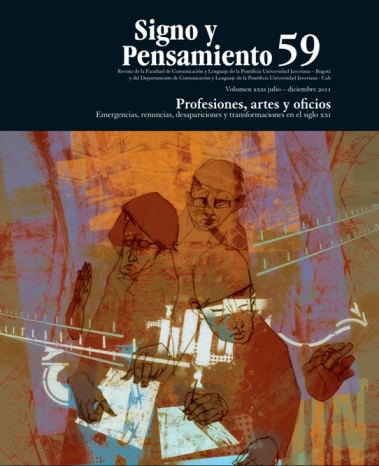Resumo
Este artigo pretende conhecer e fazer uma análise das diferentes perspectivas que estudantes, acadêmicos, empresários e autoridades educacionais têm sobre a evolução da carreira de comunicação social. Interessa-nos contrastar as diferentes visões sobre a projeção da comunicação social, as diferentes posições sobre o que deve ser a carreira, as expectativas diante do que um comunicador social deve conhecer e a evolução da profissão em relação às necessidades do país. e o mercado de trabalho. A tese central é contrastar os diferentes entendimentos que alguns atores têm em relação à projeção da carreira. Acreditamos que, apesar da visão midiática geralmente disponível, a comunicação social deve ser entendida mais como uma construção de significados, um articulador de processos sociais e um gerador de pontes entre diferentes atores, para assumir um papel de transformação social.
Cortés, C. (2011), “¿Queremos educar estudiantes para el siglo XXI?, promovamos el aprendi zaje”, en Espacio Educativo, núm. 12, pp. 15-20.
García, M. (2003), Tecnocultura y comunicación, Bogotá, Cátedra Unesco de Comunicación Social, Editorial Pontificia Universidad Javeriana.
Gutiérrez, E. (2011), “Pedagogías en la conver gencia. Ecosistemas comunicativos escolares en tiempos de la comunicación digital”, en Espacio Educativo, núm. 12, pp. 4-13.
Islas, O. (2003), Tecnocultura y comunicación, Bogotá, Cátedra Unesco de Comunicación Social, Edi torial Pontificia Universidad Javeriana.
Jenkins, H. (2008), Convergence culture. La cultura de la convergencia de los medios de comunicación, Barcelona, Paidós Comunicación.
Maloka (2011), Formación para el futuro, Bogotá, Proyecto Ubíkate.
Martín-Barbero, J. (2011), “Transformaciones comunicativas y tecnológicas de lo público” [en línea], disponible en http://www.infoame rica.org/documentosword, recuperado: 20 de abril de 2011.
Martínez Ojeda, B. (2006), Homo digitalis: etnografía de la cibercultura, Bogotá, Departa mento de Antropología, Facultad de Ciencias Sociales, Universidad de los Andes.
Martín Serrano, M. (2005, mayo), ¿Para qué sirve estudiar teoría de la comunicación?, Curso de Teoría de la Comunicación, Madrid, Univer sidad Complutense de Madrid.
Otero, E. (2006), “El ‘estado del arte’ en teoría de la comunicación: un ejercicio kuhniano”, Ciencias Sociales Online, vol. 3, núm. 1, pp. 70-90.
Pereira, J. M. (2005), “La comunicación: un campo de conocimiento en construcción. Reflexiones sobre la comunicación social en Colombia”, Investigación y desarrollo, vol. 13, núm. 2, pp. 412-441.
Roveda H., Antonio (2005), Las facultades de comunicación y periodismo de Colombia: entre las incertidumbres de la cientificidad y la claridad de las prácticas [inédito].
Roveda H., Antonio (2011, 2 de mayo) Entrevista personal con Salazar, Bogotá.
Vassallo, M. I. (2011), “La investigación de la comunicación: cuestiones epistemológicas, teóricas y metodológicas”, [en línea], disponible en: http://www.dialogosfelafacs.net/articulos/ pdf/56MariaVassallo.pdf, recuperado: 17 de abril de 2011.
Verón, E. (1983), “Construir el acontecimiento. Los medios de comunicación masiva y el accidente en la central nuclear de Three Mile Island” [en línea], disponible en: http://www.inabima.org/BibliotecaINABIMA/ EliseoVeron/el/cuerpo/reencontrado/ Ver/Construir/el/acontecimiento.PDF, p. 44, recuperado: 10 de mayo de 2011.
Esta revista científica está registrada sob a licença Creative Commons Attribution 4.0 International. Portanto, este trabalho pode ser reproduzido, distribuído e comunicado publicamente em formato digital, desde que os nomes dos autores e da Pontificia Universidad Javeriana sejam mencionados. Você pode citar, adaptar, transformar, auto-arquivar, republicar e desenvolver o material, para qualquer finalidade (inclusive comercial), desde que reconheça adequadamente a autoria, forneça um link para o trabalho original e indique se foram feitas alterações. A Pontificia Universidad Javeriana não retém os direitos sobre os trabalhos publicados e o conteúdo é de responsabilidade exclusiva dos autores, que mantêm seus direitos morais, intelectuais, de privacidade e publicidade.


